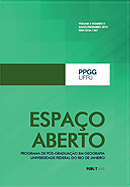Economic Scales and Cross-border Regions in Latin America
DOI:
https://doi.org/10.36403/espacoaberto.2019.27347Keywords:
Regionalization, Territorialization, Cross-border RegionsAbstract
Considering regions in their multidimensional conditions and as inseparable from the geography of unequal capitalist development, this article has the aim of proposing a typology of situations in one of the modalities of regionalization that best signals processes of neo-liberal territorialization: cross-border regions, especially those present in Latin America. The article summarizes two examples of cross-border interaction typologies, proposed respectively by Retis (2005) and by Oliveira (2005), which serve as a starting point for our proposal for a new typology, which differentiates a) customary regions, b) self-contained regions, c) corridor regions and d) globalized regions. Based on the characteristics of border dynamics in regions, this flexible typology of Latin American cross-border regions is based on one specific profile, which derives from the economic connections that govern the scope of trade in these spaces.


